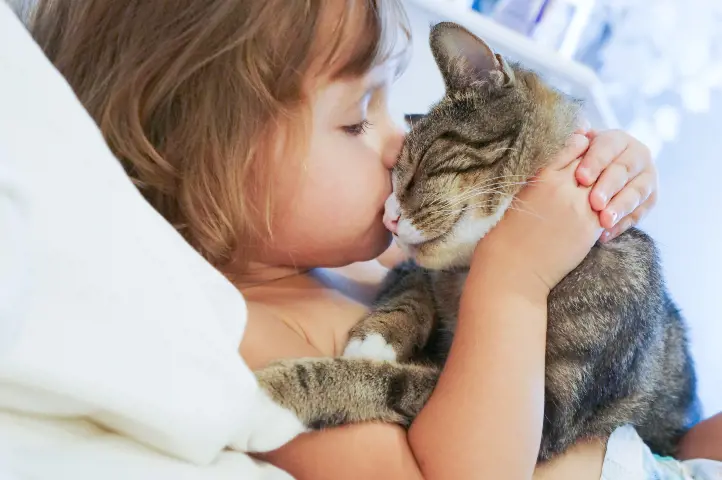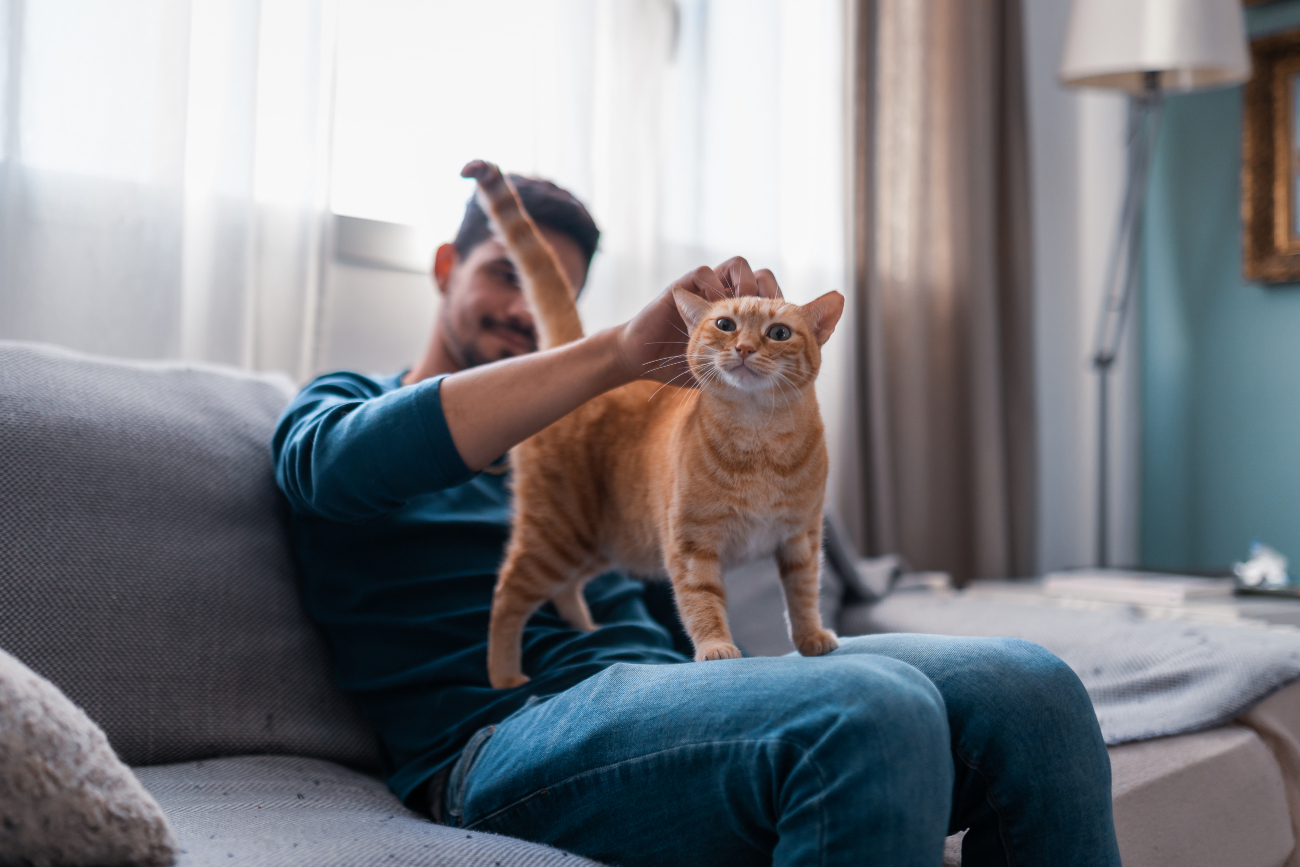Deciphering feline affection: Does my cat know that I love them?
25th January, 2024

Introduction
The enigma of feline affection is a puzzle that has perplexed cat owners since time immemorial. Unlike the overt expressions of love displayed by their canine counterparts, cats have a distinctive, subtler way of showing their affection. This often leaves cat parents in a state of quandary, pondering the question: does my cat know that I love them?
Contrary to popular belief, cats are not aloof or indifferent. They form strong attachments to their human caregivers and reciprocate their love in unique ways. While they may not wag their tail or lick your face like dogs, cats have their own vocabulary of love that's waiting to be understood and appreciated.
So, does your cat know that you love them? The answer is a resounding 'yes'! Let's dive into the intricate world of feline affection and decipher the enigmatic ways in which cats express their love.
Decoding feline love language
Understanding feline attachment
Cats are known for their independent streak, but that doesn't mean they don't form deep connections with their human caregivers. In fact, they show a level of loyalty and attachment that rivals that of dogs. There have been instances where cats have travelled hundreds, even thousands, of miles through unfamiliar terrains to reunite with their beloved owners.
Cats form a strong bond with their human caregivers, viewing them as part of their 'cat clan'. Research has shown that domestic cats perceive their human caregivers as their real-life parents.
A 2019 study revealed that kittens exhibit the same behaviour towards their human caregivers as they do towards their biological parents. This behaviour continues into their adulthood, cementing the bond between humans and their feline friends.
The role of oxytocin in cat affection
Oxytocin, fondly known as the 'love hormone', plays a crucial role in feline-human bonding. This hormone is released during positive interactions, including petting, grooming, or simply spending quality time together. Interestingly, it's not just humans that release oxytocin when interacting with their pets.
Cats and dogs also release this hormone when they are in the company of their human caregivers. This hormonal response strongly suggests that cats experience pleasant feelings and form a bond with their human caregivers, further corroborating the concept of feline affection.
Feline behaviour: A testament to cat affection
Cats express their affection through an array of behaviours that, once decoded, can provide insights into their feelings towards their human caregivers. Whether it's rubbing their heads against you, purring contentedly in your lap, or gazing lovingly into your eyes, your human companions are constantly communicating their affection.
The slow blink: Feline kisses
One of the most endearing ways cats express their affection is through the 'slow blink'. This affectionate gesture involves the cat making eye contact with someone they trust and slowly closing their eyes. This is akin to a cat's version of a kiss.
You can reciprocate this gesture by meeting their gaze and slowly blinking back at them. This non-verbal communication, known as 'kitty kisses', is a great way to express your affection and build a deeper bond with your feline friend.
Cat chatter: The cat language of love
Cats communicate their feelings through a unique set of sounds, which they usually reserve for their human caregivers. Imitate these sounds during a tender moment to express your affection. Your cat may respond with the same sounds, reinforcing the bond between you two.
The power of purring
Purring is a clear indicator of a cat's affection towards its caregiver. When a cat is content, they let out a deep, melodious purr that can melt even the hardest of hearts. This is one of the sweetest experiences a cat parent can have, signifying the deep bond shared between them and their furry friend.
The rub and bunt: A mark of feline affection
Cats show affection by rubbing their heads or bodies against their human caregivers. This behaviour, known as 'bunting', is a way for cats to leave their scent on you, effectively marking you as part of their family. It's their way of saying, "You're mine, and I love you".
The gift of 'prey': A sign of trust and affection
Cats are natural-born hunters. If your cat brings you a dead mouse or bird, don't be repulsed. This is a sign of trust and affection. In the wild, cats bring their prey back to their lair to share with their family. By giving you their 'catch', your cat is treating you as part of their family.
Showing your love: A guide for cat parents
Now that we've unravelled the mysteries of feline affection, let's delve into how you can reciprocate these feelings and show your cat how much you love them. Here are some of the ways you can tell your cat 'I love you' in their language.
The art of slow blinking
As mentioned earlier, slow blinks are a powerful way to express your love to your cat. It's like giving your cat a gentle, loving kiss. Get down to your cat's level, meet their gaze, and slowly blink at them. Your cat will recognise and appreciate this gesture, helping to strengthen your bond with them.
Mimicking their sounds
Imitate the unique sounds your cat makes to communicate their feelings. This will help your cat feel understood and loved. Pay attention to their trills, coos, and meows, and try to imitate these sounds during your bonding moments.
Allowing them to rub and bunt
Allow your cat to rub against you and bunt their head on you. This is their way of marking you as their own and expressing their affection. You can reciprocate by leaning into their head bonks and allowing them to wind themselves around your legs.
Regular grooming sessions
Regular grooming sessions can be a great way to show your love to your cat. Cats groom themselves and each other as a sign of affection.
You can reciprocate by brushing their fur gently or using a pet grooming glove. Some cats even enjoy a warm, damp cloth rubbed along their heads and backs, reminiscent of the tongue baths their mothers gave them as kittens.
Regular vet visits
Regular vet visits are an essential part of showing your love to your cat. Cats are adept at hiding signs of illness or discomfort. Without regular vet visits, you might miss crucial opportunities to diagnose and treat health issues, thereby ensuring a long and happy life for your feline friend.
Consider getting a cat insurance quote for your furry friend for additional peace of mind. You can easily get a quote through the website or by contacting the cat insurance team at 0330 102 5748.
Respecting their space
Respect your cat's space and boundaries. If your cat needs alone time, allow them to have it. Your cat will appreciate this gesture and understand that you respect their needs.
Gentle massage sessions
Most cats love gentle massages. Spend quality time with your cat, gently massaging their back, neck, and head. This not only feels good to your cat but also strengthens the bond between you two.
Providing interactive toys and perches
Cats are naturally curious and active creatures. Providing them with interactive toys or perches can help keep their minds occupied and ward off boredom. This is especially important if your cat is left alone at home for extended periods.
Encouraging their hunting instincts
Cats have a natural instinct to hunt. Encourage this cat behaviour with indoor hunting activities. This can involve interactive toys that mimic prey, encouraging your cat to stalk and pounce.
Remember, your cat will know you love them when you encourage this natural behaviour and provide them with plenty of opportunities to hunt safely indoors.
Appreciating their true cat nature
One of the best ways to show your love to your cat is to appreciate their true cat nature. Cats are unique creatures with distinctive behaviours and instincts. By understanding and respecting these, you can foster a deeper bond with your furry friend.
Conclusion

Deciphering feline affection can seem like a daunting task, given their unique ways of expressing love. However, once you understand their love language, you'll be able to reciprocate their feelings and build a stronger bond with your furry friend.
So, to answer the question, "does my cat know that I love them?", yes, they do! It's just about learning to communicate love in a language they understand and appreciate.
Helpful Pages
Recent Posts
Pet Insurance Quote
- 98% claims paid *
- Claims paid directly to vets
- 24/7 vet video consultations
- Interest free monthly payments




